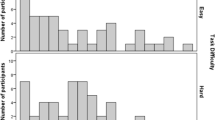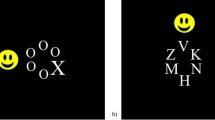Abstract
Rationale
Inattentional blindness (IB) describes the failure to notice salient but unexpected stimuli in one’s focal visual field. It typically occurs while performing a demanding task (e.g. tracking and counting basketball passes), which consumes attentional resources. Alcohol intoxication is also known to reduce attentional resources, thereby potentially increasing IB and disrupting task performance.
Objectives
To test the extent to which acute alcohol and task difficulty disrupt counting performance and increase the rate of IB across two experimental tasks.
Methods
To test the effects of alcohol consumption and task difficulty on IB, we used the Simons and Chabris (Percept 28:1059-1074, 1999) and Simons (2010) “gorilla in our midst” basketball clip in experiment 1 and abstract but analogous stimuli presented in a computerised alternative to that task in experiment 2.
Results
IB was associated with increased (counting) task difficulty but not alcohol consumption. However, counting accuracy was impaired by both alcohol and increased task difficulty, with the largest detriment being for alcohol participants who noticed the salient but unexpected stimulus.
Conclusion
The absence of alcohol effects on IB in both experiments was unexpected and warrants further investigation in a field vs lab study comparison and in combination with baseline cognitive measures to test for alcohol expectancy and task compensation effects.



Similar content being viewed by others
References
Bayless SJ, Harvey AJ (2017) Testing alcohol myopia theory: examining the effects of alcohol intoxication on simultaneous central and peripheral attention. Percept 46:90–99. https://doi.org/10.1177/0301006616672221
Bayless SJ, Harvey AJ, Kneller W, Frowd C (2018) Do intoxicated witnesses produce poor facial composite images? Psychopharmacol 235:2991–3003. https://doi.org/10.1007/s00213-018-4989-2
Beanland V, Pammer K (2010) Looking without seeing or seeing without looking? Eye movements in sustained inattentional blindness. Vision Res. 50(10):977–988. https://doi.org/10.1016/j.visres.2010.02.024
Bressan P, Pizzighello S (2008) The attentional cost of inattentional blindness. Cognition 106:370–383
Canto-Pereira LHM, David IPA, Machado-Pinheiro W, Ranvaud RD (2007) Effects of acute alcohol intoxication on visuospatial attention. Hum Exp Toxicol 26:311–319. https://doi.org/10.1177/0960327106070490
Caparos S, Linnell KJ (2010) The spatial focus of attention is controlled at perceptual and cognitive levels. J Exp Psychol: Hum Percept Perf 36(5):1080–1107. https://doi.org/10.1037/a0020367
Chabris CF, Weinberger A, Fontaine M, Simons DJ (2011) You do not talk about fight club if you do not notice fight club: inattentional blindness for a simulated real-world assault. I-Percept 150–153. https://doi.org/10.1068/i0436
Clifasefi SL, Takarangi MKT, Bergman JS (2006) Blind drunk: the effects of alcohol on inattentional blindness. Appl Cogn Psychol 20:697–704. https://doi.org/10.1002/acp.1222
Compo NS, Evans JR, Carol RN, Kemp D, Villalba D, Ham LS, Rose S (2011) Alcohol intoxication and memory for events: a snapshot of alcohol myopia in a real-world drinking scenario. Mem 19:202–210. https://doi.org/10.1080/09658211.2010.546802
Corneille O, Lush P (2021) Sixty years after Orne’s American psychologist article: a conceptual framework for subjective experiences elicited by demand characteristics. https://doi.org/10.31234/osf.io/jqyvx
Cullen HJ, Paterson HM, van Golde C (2020) Mock juror perceptions of witness inattentional blindness. J Police Crim Psych. https://doi.org/10.1007/s11896-020-09399-7
Curtin JJ, Lang AR (2007) Alcohol and emotion: insights and directives from affective science. In: Rottenberg J, Johnson SL (eds) Emotion and psychopathology: Bridging affective and clinical science. American Psychological Association, pp 191–213. https://doi.org/10.1037/11562-009
Faul F, Erdfelder E, Lang A-G, Buchner A (2007) G*Power 3: a flexible statistical power analysis program for the social, behavioral, and biomedical sciences. Beh Res Methods 39:175–191
Faul F, Erdfelder E, Buchner A, Lang A-G (2009) Statistical power analyses using G*Power 3.1: Tests for correlation and regression analyses. Beh Res Methods 41:1149–1160
Fillmore MT, Blackburn J (2002) Compensating for alcohol-induced impairment: alcohol expectancies and behavioural disinhibition. J Stud Alc 63:237–246
Fillmore MT, Dixon MJ, Schweizer TA (2000) Alcohol affects processing of ignored stimuli in a negative priming paradigm. J Stud Alc 61(4):571–578. https://doi.org/10.15288/jsa.2000.61.571
Findlay JM (2005) Covert attention and saccadic eye movements. In: Itti L, Rees G, Tsotsos T (eds) Neurobiology of attention. Academic Press, New York, pp 114–117. https://doi.org/10.1016/B978-012375731-9/50024-0
Harvey AJ (2014) Some effects of alcohol and eye movements on cross-race face learning. Mem 22:1126–1138. https://doi.org/10.1080/09658211.2013.872278
Harvey AJ (2016) When alcohol narrows the field of focal attention. Q J Exp Psychol 69: 669-677.DOIi. https://doi.org/10.1080/17470218.2015.1040803
Harvey AJ, Seedhouse M (2021) Influence of alcohol and cognitive capacity on visual number judgements. Percept 50(1):39–51. https://doi.org/10.1177/0301006620984105
Harvey AJ, Tomlinson DA (2019) Alcohol myopia and the distracting effects of hair in face recognition. J Psychopharm 34:237–244. https://doi.org/10.1177/0269881119882856
Harvey AJ, Kneller W, Campbell AC (2013a) The effects of alcohol intoxication on attention and memory for visual scenes. Mem 21:969–980. https://doi.org/10.1080/09658211.2013.770033
Harvey AJ, Kneller W, Campbell AC (2013b) The elusive effects of alcohol intoxication on visual attention and eyewitness memory. App Cognit Psychol 27:617–624. https://doi.org/10.1002/acp.2940
Harvey AJ, Bayless SJ, Hyams G (2018) Alcohol increases inattentional blindness when cognitive resources are not consumed by ongoing task demands. Psychopharmacol 235:309–315. https://doi.org/10.1007/s00213-017-4772-9
Hyman IE, Jr. Boss SM, Wise BM, McKenzie KE, Caggiano JM (2010) Did you see the unicycling clown? Inattentional blindness while walking and talking on a cell phone. Appl Cogn Psychol 24:596–607. https://doi.org/10.1002/acp.1638
Jaffe AE, Harris CM, DiLillo D (2019) Observing alcohol myopia in the context of a trauma film paradigm: differential recall of central and peripheral details. Alc Clin Exp Res 43(10):2203–2211. https://doi.org/10.1111/acer.14156
Josephs RA, Steele CM (1990) The two faces of alcohol myopia: attentional mediation of psychological stress. J Abnorm Psychol 99:115–126
Kreitz C, Furley P, Memmert D, Simons DJ (2015) Inattentional blindness and individual differences in cognitive abilities. PLoS ONE 10(8):e0134675. https://doi.org/10.1371/journal.pone.0134675
Lavie N (2006) The role of perceptual load in visual awareness. Brain Res 1080:91–100
Lavie N, Beck DM, Konstantinou N (2014) Blinded by the load: attention, awareness and the role of perceptual load. Philos Trans R Soc Lond B Biol Sci 369(1641):201320205. https://doi.org/10.1098/rstb.2013.0205
Lavie N, De Fockert J (2005) The role of working memory in attentional capture. Psych Bull Rev 12(4):669–674. https://doi.org/10.3758/BF03196756
Lavie N, De Fockert J (2006) Frontal control of attentional Capture in visual search. Vis Cogn 14:863–876. https://doi.org/10.1080/13506280500195953
Lavie N, Hirst A, De Fockert J. W, Viding E (2004) Load theory of selective attention and cognitive control. J Exp Psychol Gen 133:339–354. https://doi.org/10.1037/0096-3445.133.3.339
Lehr D (2009) The fence: a police cover-up along Boston's racial divide. Harper-Collins), (New York
Mack A, Rock I (1998) Inattentional blindness. The MIT Press
Magrys SA, Olmstead MC (2014) Alcohol intoxication alters cognitive skills mediated by frontal and temporal brain regions. Brain Cognition 85:271–276. https://doi.org/10.1016/j.bandc.2013.12.010
McKay D, Schare ML (1999) The effects of alcohol and alcohol expectancies on subjective reports and physiological reactivity: a meta-analysis. Addict Behav 24:633–647
Moskowitz H, Sharma S (1974) Effects of alcohol on peripheral vision as a function of attention. Hum Factors 16:174–180. https://doi.org/10.1177/001872087401600209
Most SB, Simons DJ, Scholl BJ, Chabris CF (2000) Sustained inattentional blindness: The role of location in the detection of unexpected dynamic events. Psyche 6(14). http://journalpsyche.org/files/0xaa86.pdf
Most SB, Simons DJ, Scholl BJ, Jimenez R, Clifford E, Chabris CF (2001) How not to ne seem: the contribution of similarity and selective ignoring to sustained inattentional blindness. Psychol Sci. https://doi.org/10.1111/1467-9280.00303
Most SB, Scholl BJ, Clifford ER, Simons DJ (2005) What you see is what you set: sustained inattentional blindness and the capture of awareness. Psychol Rev 112:217–242
Mumenthaler MS, Taylor JL, O’Hara R, Yesavage JA. Gender differences in moderate drinking effects. Alc Res Health. 1999;23:55–64
Ogden JD, Moskowitz H (2004) Effects of alcohol and other drugs on driver performance. Traffic Inj Prev 5:185–198
Peirce JW (2009) Generating stimuli for neuroscience using PsychoPy. Fron Neuroinform https://doi.org/10.3389/neuro.11.010.2008
Perugini M, Gallucci M, Costantini G (2018) A practical primer to power analysis for simple experimental designs. Int Rev Social Psych 31(1):20. https://doi.org/10.5334/irsp.181
Posner MI (1980) Orienting of attention. Q J Exp Psychol 32:3–25
Schulte T, Müller-Oehring EM, Strasburger H, Warzel H, Sabel BA (2001) Acute effects of alcohol on divided and covert attention in men. Psychopharmacol 154:61–69. https://doi.org/10.1007/s002130000603
Simons DJ (2010) The monkey business illusion. http://www.youtube.com/watch?v=IGQmdoK_ZfY. Accessed 1 April 2013
Simons DJ, Chabris CF (1999) Gorillas in our midst: sustained inattentional blindness for dynamic events. Percept 28:1059–1074. https://doi.org/10.1068/p281059
Steele CM, Josephs RA (1990) Alcohol myopia: its prized and dangerous effects. Am Psychol 45:921–933. https://doi.org/10.1037//0003-066X.45.8.921
Suchotzki K, May H, Gamer M (2020) No effect of moderate alcohol intake on the detection of concealed identity information in the laboratory. Sci Rep 10:20161. https://doi.org/10.1038/s41598-020-76811-x
Testa M, Fillmore MT, Norris J, Abbey A, Curtin JJ, Leonard KE, Mariano KA, Thomas MC, Nomensen KJ, George WH, Vanzile-Tamsen C, Livingston JA, Saenz C, Buck PO, Zawacki T, Parkhill MR, Jacques AJ, Hayman LW Jr (2006) Understanding alcohol expectancy effects: revisiting the placebo condition. Alc Clin Exp Res 30(2):339–348. https://doi.org/10.1111/j.1530-0277.2006.00039.x
Voas RB, Tippetts AS, Fell J (2000) The relationship of alcohol safety laws to drinking drivers in fatal crashes. Accid Anal Prev 32:483–492. https://doi.org/10.1016/s0001-4575(99)00063-9
Acknowledgements
We thank Kaylee Harvey and Dr Debbie Crossland for the help with data collection.
Author information
Authors and Affiliations
Corresponding author
Ethics declarations
Conflict of interest
On behalf of all authors, the corresponding author states that there is no conflict of interest.
Additional information
Publisher’s note
Springer Nature remains neutral with regard to jurisdictional claims in published maps and institutional affiliations.
Rights and permissions
About this article
Cite this article
Bayless, S.J., Harvey, A.J. & Keating, S. Effects of alcohol and task difficulty on visual tracking and inattentional blindness. Psychopharmacology 239, 2605–2617 (2022). https://doi.org/10.1007/s00213-022-06148-y
Received:
Accepted:
Published:
Issue Date:
DOI: https://doi.org/10.1007/s00213-022-06148-y




